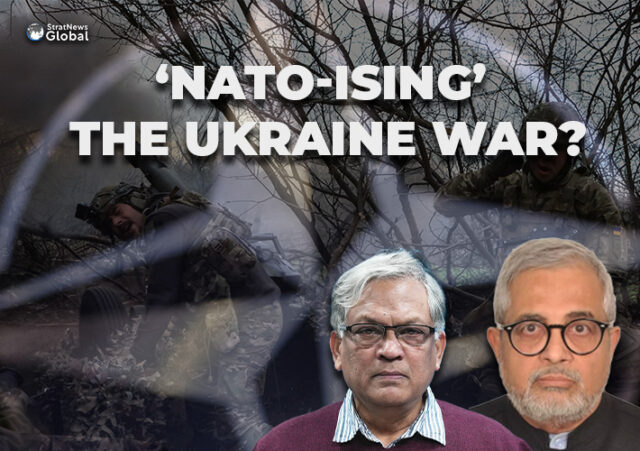Is NATO seeking to do the heavy lifting in the Ukraine war? With the $60 million aid package for Kyiv still stalled in the US Congress, NATO secretary-general Jens Stoltenberg has proposed a $100 billion fund that would bring a measure of stability and assurance in the supply of arms and ammunition to Ukraine.
The move is also seen as “Trump proofing”, ensuring that in the event of Donald Trump winning the elections later this year, and pulling the plug on support for Ukraine, there remains a fund that will continue to sustain the Ukrainian war effort for some more time.
But Nandan Unnikrishnan, head of the Russia studies program at the Observer Research Foundation in Delhi, seriously doubts if NATO would do anything without Washington’s backing. In his view, US national security interests will prevail no matter what the complexion of the government in DC.
Unnikrishnan, who was a guest on ‘The Gist‘, also believes the war is entering a stage where Russia will gradually move its forces to control the administrative borders of the districts it occupies in eastern Ukraine. They may even try and block Ukraine’s approach to the Black Sea, he says, but doubts if that is possible.
Ukraine continues to make up for its lack of sufficient 155mm artillery shells or even rocket artillery, by using drones to hit targets deep inside Russia. The Russians are doing the same, developing their own drones and also buying cheap ones from Iran and North Korea.
Unnikrishnan says the war will drag on for another year at least with no visible or credible opposition to the war in Russia. In fact, many Russians believe that the historical borders of their country are in Ukraine. In that sense, the war is probably seen as “just”. It helps that the economy continues to do well. That may change a year down the line.
Last word on the visit of Ukraine’s foreign minister Dmytro Kuleba to Delhi, a week ago. Unnikrishnan wonders if Kuleba really wanted to come, and if Delhi really wanted to host him. It appears both may have succumbed to Western diplomatic pressure. In Delhi, Kuleba’s schedule did not include an interaction with NSA Ajit Doval nor calling on Prime Minister Modi, key signals as to how the visit was viewed.
Thirty eight years in journalism, widely travelled, history buff with a preference for Old Monk Rum. Current interest/focus spans China, Technology and Trade. Recent reads: Steven Colls Directorate S and Alexander Frater's Chasing the Monsoon. Netflix/Prime video junkie. Loves animal videos on Facebook. Reluctant tweeter.





